|
|
|
Sort Order |
|
|
|
Items / Page
|
|
|
|
|
|
|
| Srl | Item |
| 1 |
ID:
147729
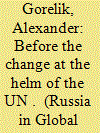

|
|
|
|
|
| Summary/Abstract |
Similar to its status in the last twenty to forty years, the United Nations is still a landmark on the global political landscape. It is still the forefront for key events to unfold, a shrine to secure a blessing for a crucial agreement (say, the Iran nuclear deal in July 2015), and a resort to amplify a technical arrangement. New York City remains the Mecca of global diplomacy.
|
|
|
|
|
|
|
|
|
|
|
|
|
|
|
|
| 2 |
ID:
147731


|
|
|
|
|
| Summary/Abstract |
The presidential race in the United States has entered its final stretch, meaning it is time to pause and take stock of events. Not surprisingly, the campaign has revealed profound fissures between Democrats and Republicans, which has been the case in all recent elections since 1996 (Bill Clinton and Bob Dole), but especially in 2000 (George W. Bush and Al Gore) and 2008 (Barack Obama and John McCain). No less important is the deep divide between the entire U.S. foreign policy elite and society.
|
|
|
|
|
|
|
|
|
|
|
|
|
|
|
|
| 3 |
ID:
147734
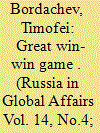

|
|
|
|
|
| Summary/Abstract |
On June 5, 2016, a group of armed militants attacked National Guard weapons depots and barracks in the city of Aktobe, north-western Kazakhstan, some 253 kilometers from Russia's Orenburg. Several dozen people, including the attackers, died in the clash. Siloviki, a term commonly used in post-Soviet countries for security and law enforcement agencies, did not hide their perplexity over what had happened, and foreign observers commented that the situation in Kazakhstan, long seen as a model of stability among the southernmost former Soviet republics, might deteriorate sharply. These events highlight the need for a discussion on broad international cooperation to ensure regional stability, create new institutional formats, and foster collaboration among CSTO and SCO structures.
|
|
|
|
|
|
|
|
|
|
|
|
|
|
|
|
| 4 |
ID:
147737


|
|
|
|
|
| Summary/Abstract |
The Russian Far East is a strategically important region due to its favorable geographical location and rich natural resources. However, several factors make this region vulnerable, one of them being migration processes which have a serious impact on the local social and political situation. In the late 2000s and early 2010s, the region experienced a high inflow of migrants from Central Asia and the South Caucasus, whose ethno-cultural and religious traditions are in stark contrast to the local way of life. Migrants have built Islamic infrastructure and the halal industry in the region, and more and more often they ask for plots of land to build mosques there, occasionally provoking conflicts with local residents. There are also problems caused by the growth of Islamic extremism. In August 2015, Russian Security Council Secretary Nikolai Patrushev told the media about attempts by Islamic State (ISIS) emissaries to recruit migrant workers living in the Russian Far East. Some local residents have also gone to the Middle East to join ISIS forces. "Foreign citizens, who may be involved in international terrorist and extremist organizations and illegal armed groups, are now trying to become legalized in taiga villages and major cities of the Russian Far East," Patrushev said.
|
|
|
|
|
|
|
|
|
|
|
|
|
|
|
|
| 5 |
ID:
147736
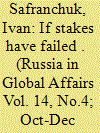

|
|
|
|
|
| Summary/Abstract |
When the Central Asian governments realized that these projects were the main alternatives, the Ukrainian crisis was already raging. It greatly distorted the perception of any initiative by local elites. Their ideas of a geopolitical balance had changed over the previous decade, and now they preferred geopolitical neutrality and were very wary of everything with a shadow of geopolitics. They had long sensed this shadow in the Russian and U.S. proposals, and were therefore more disposed towards the Chinese one. Nevertheless, they were well aware of all the pitfalls and had no intention to end up on the sidelines of the Chinese economy.
|
|
|
|
|
|
|
|
|
|
|
|
|
|
|
|
| 6 |
ID:
147726


|
|
|
|
|
| Summary/Abstract |
Ideology is generally considered as one of the key reasons, if not the main one, for the collapse of the Soviet Union. Indeed, Italian political philosopher Norberto Bobbio asserts that "the catastrophe of historical communism" was not caused by a systemic crisis or a military defeat, but the fact that "in a seemingly irreversible way, the greatest political Utopia in history ... has been completely upturned into its exact opposite." "Sociologized" interpretations of the ideological crisis portray it as the de-legitimization of Soviet power through its own practices (inequality, corruption, nepotism, etc.), which turned the moral principles and goals the country had declared into their grotesque semblance. More "belletristic" interpretations blame it on "the troubadours of perestroika," who exposed the "lies" of communism and opened the eyes of millions of people deceived by the system (Leon Aron's book Roads to the Temple is a classic example). In any case, the crisis of ideology that undermined the Soviet regime was manifested in various ways: 1) as a process that disavowed "Marxism-Leninism" (as an ill-fated Utopian experiment and "the opium of the people"); 2) as a catharsis that leads from the "world of lies" to the "world of truth" (even though Bobbio describes the latter as just another kind of Utopia--that of a free market economy and democratic capitalism); 3) as a pivotal event that brought former communist countries onto the path of progressive and "civilized" development.
|
|
|
|
|
|
|
|
|
|
|
|
|
|
|
|
| 7 |
ID:
147725


|
|
|
|
|
| Summary/Abstract |
Any serious discussion of the Russian foreign policy inevitably begins with a question about developments and trends in the world as a whole. These days, virtually every work on Russia's foreign policy is predicated on the notion that there is a systemic crisis of the liberal world order. For some, this crisis is a tragedy of historical scale; for others, it is a long-awaited confirmation of old prophecies; and for still others, an unexpected gif. Whatever diagnostic methods used, the principal symptoms of the crisis are as follows.
|
|
|
|
|
|
|
|
|
|
|
|
|
|
|
|
| 8 |
ID:
147735


|
|
|
|
|
| Summary/Abstract |
Cooperation and interaction between Russia and China, based on equitable and constructive partnership, over the past twenty years have become truly strategic and all-embracing, both rhetorically and practically. The formula "forever friends, never enemies" succinctly but vividly conveys the general political vision of what Russian-Chinese relations should be like now and in the future, and contains a kind of genotype of these relations.
|
|
|
|
|
|
|
|
|
|
|
|
|
|
|
|
| 9 |
ID:
147730
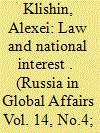

|
|
|
|
|
| Summary/Abstract |
Current events in Europe are causing concern among many Europeans and excitement among political analysts. We are accustomed to an Old World that is a land of prosperity and order, with respect for the law and tranquility. Of course, many things have happened in Europe, but the current situation--from rampant anti-Russian rhetoric and economic sanctions, to helplessness in the face of an influx of newcomers, not always invited and not willing to live according to European rules--is perplexing.
|
|
|
|
|
|
|
|
|
|
|
|
|
|
|
|
| 10 |
ID:
147724


|
|
|
|
|
| Summary/Abstract |
The future and the past can meet sometimes--when the present is at an impasse, like it is today. For a quarter of a century now, we have been tirelessly building a new world order, but suddenly time seems to have rolled back, reviving the talk of a new Cold War, an ideological conflict, arms control, and nuclear confrontation.
|
|
|
|
|
|
|
|
|
|
|
|
|
|
|
|
| 11 |
ID:
147727
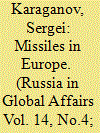

|
|
|
|
|
| Summary/Abstract |
There is an increasingly strong feeling of déjà vu as some of Russia's Western partners are trying to replay the scenario of the late 1970s and early 1980s when the deployment of Soviet SS-20 medium-range missiles and American Pershing and land-based cruise missiles in Europe triggered a long military-political crisis. As a result, the mounting campaign for détente in Europe was halted or even reversed for many years.
|
|
|
|
|
|
|
|
|
|
|
|
|
|
|
|
| 12 |
ID:
147739


|
|
|
|
|
| Summary/Abstract |
The "war of attrition" within the Organization of Petroleum Exporting Countries (OPEC) for the retention of the market share has raised a question of the cartel's future and, more broadly, changes in the political economy of the Middle Eastern oil market. With the impact of U.S. shale production being the "usual suspect" in international oil market discussion, the rivalry between the Islamic Republic of Iran and the Kingdom of Saudi Arabia opens yet another chapter of what seems to be a steady demise of the function OPEC was set to play at the time of its establishment. The Iranian-Saudi rivalry, which reverberates in conflict-ridden Syria and Yemen, is the key development that affects the global oil order in a profound way. The petroleum cartel's main function--oil price-setting by production-adjusting--was put into question at OPEC's November 27, 2014 meeting. Following the meeting, commentators pointed out to structural changes within the group, involving
|
|
|
|
|
|
|
|
|
|
|
|
|
|
|
|
| 13 |
ID:
147738


|
|
|
|
|
| Summary/Abstract |
Energy cooperation is one of the key areas of Russia's international activity. It helps it develop mutually advantageous trade relations and ensure energy security for itself and its partners. The implementation of international projects strengthens the positions of Russian companies on markets that interest Moscow, improves competences important for the economy, and raises the general level of competitiveness of the Russian fuel/energy sector.
|
|
|
|
|
|
|
|
|
|
|
|
|
|
|
|
| 14 |
ID:
147733


|
|
|
|
|
| Summary/Abstract |
Two leadership models have historically evolved in the EU. The European Commission (EC) provides the first model. It was the most influential institution at the start of European integration (1950s), as well as during the presidency of Jacques Delors (1980s), when a common internal market emerged and the transition towards a single currency began. Its main asset was technocracy as well as the reputation and charisma of the EC president. The second leadership model is embodied in the Franco-German tandem, where Paris exercised political leadership while Germany guaranteed sustained economic growth. In this context, the consensus between Paris and Berlin responded to the demands of all other EU members. The main asset of this model was its capability to accommodate different interests, combined with crisis management experience.
|
|
|
|
|
|
|
|
|
|
|
|
|
|
|
|
| 15 |
ID:
147728


|
|
|
|
|
| Summary/Abstract |
U.S.-Chinese relations are "the most important bilateral relations in the 21st century," as Chinese politicians and scholars like to emphasize. Gradually, they have become a central, if not the main, narrative in world politics. Various things, ranging from Russia's foreign policy to the situation in regions that are distant from Asia, depend on the future vector of these relations. Now, however, relations between China and the United States are going through hard times, prompting the question: How far will their disagreements go? In answering this question, it is worth recalling why the U.S. and China began to cooperate years ago, what objectives they pursued, and what results they have achieved.
|
|
|
|
|
|
|
|
|
|
|
|
|
|
|
|
|
|
|
|
|